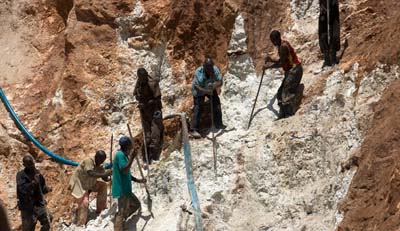
After more than a decade of conflict in Congo, fueled by the illegal trade in conflict minerals, new U.S. regulations governing the trade are supposed to take effect in April. But industry trade groups claim this is too fast, so they are pushing for a delay in fully implementing the regulations.
These trade groups, along with the Rwandan government, are now claiming they are unprepared to comply with the reporting requirements required by U.S. legislation to determine whether extraction of these minerals contributes to funding ongoing conflict. They raise the specter of a de facto trade embargo in the region if companies can't comply, which would cause communities in eastern Congo to suffer. But if the past 10 years are any indication, it is clear that the extractive companies, electronics industry, and regional governments are not always most concerned with the welfare of the Congolese people.
From the end-use companies such as HP, Dell, and Intel, to the industry trade groups representing the tin and tantalum industries, those responsible for sourcing, transporting, trading, and ultimately using the minerals from eastern Congo have never taken action to stop the trade from funding illegal armed actors or mitigate the occurrence of mass atrocities until forced to do so by law.
It was the U.S. passage of the conflict minerals provision within the Dodd-Frank Act last July that was the impetus for these stakeholders to take any action at all to trace the extraction, export, processing, and end-use of the minerals. Since the link between conflict minerals and electronics products became widely known in 2001, the handwriting has been on the wall—a mineral certification process is necessary to eliminate a key source of funding for ongoing atrocities in eastern Congo.
Now the same players need an extension? There will no doubt be challenges to standing up a regional traceability and certification system. But pressure for the necessary action must be applied. Simply allowing never-ending appeals for more time or ambiguous reporting requirements is unacceptable.
Critics of the legislation immediately point out the negative impact on livelihoods that could arise if the U.S. law results in a de facto embargo. But as the recent Congolese government ban on mining in Congo’s three eastern provinces has shown, an embargo will not stop
mining. Militarized extraction and black market trading will continue, with military actors, traders and exporters still making huge profits off the trade. Whether under an embargo or the status quo of illegal armed groups controlling the trade, mining communities continue to
struggle. The suffering of these mining communities is not the result of U.S. legislation; it is the result of the actions of illegal armed groups operating with near total impunity.
Additionally, industry stakeholders’ threat to walk away from Congo is likely a bluff. Many are entrenched in extraction, transport, and trade; they would not be able to absorb the withdrawal. The significance of Congo’s mineral reserves is too great for world markets to ignore, particularly in the case of tantalum, which currently accounts for as much as between 30-60 percent of the world’s global supply. If responsible companies were forced to find alternative sources outside Congo, some companies with less reputational risk would still procure cheaper conflict minerals in Congo and be able to gain a competitive advantage as global prices rose. So companies affected by the U.S. legislation have very little incentive to ensure the speedy stand-up of a regional certification system that would enable the credible sourcing of responsible materials from the region and avoid such a scenario. They just have to be made to do so.
Throughout the process of attempting to implement the conflict minerals law, a number of actors including industry representatives, the government of Rwanda, and the U.S. Department of State have tried to delay and water down reporting requirements as well as ensure that there is as little transparency and accountability in the process as possible. The tin, tantalum, and electronics industry would all advocate for a “transition period” or “phased implementation” for reporting requirements. Within this transition period, companies mandated to report to the SEC could report that they were not yet able to determine where their minerals came from. There is no other precedent in international trade regulation that allows for companies to skirt this type of required reporting — not in drug manufacturing, auto manufacturing, or even in toy manufacturing. If a company or industry representative reports to the SEC that “they don’t know” where the material for their products comes from, this falls into one of three categories: negligence, gross negligence, or fraud.
Photo: Miners working in a tantalum mine (Enough/Sasha Lezhnev)

